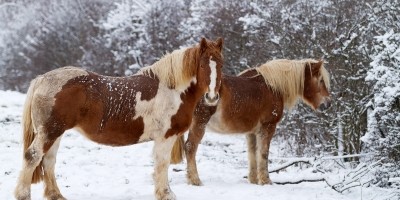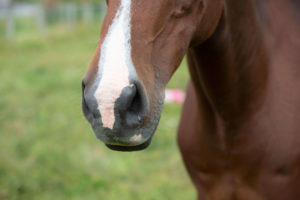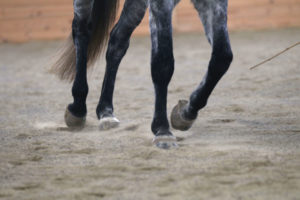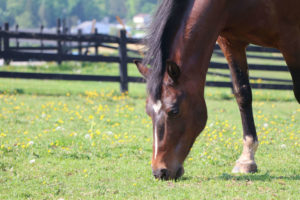As the temperatures drop, you may notice your horse’s weight dropping as well. It is important to be extra watchful of your horse’s body condition in the winter months because most of the natural forage is gone, and he is burning extra calories to stay warm in the winter weather. Take a close look at your horses body condition now, then make a point to check him every week, feeling for his ribs and other bony structures, as just doing a visual check can be very deceiving if he has a thick winter coat. If he wears a blanket, pull it off to do the body condition check. When evaluating body condition, the most important areas to examine are the ribs, flanks, back, and along the tail head. The equine body condition scoring system can be found here: http://horse.purinamills.com/products/bodyconditionsscoringchart/default.aspx.
There are some general feeding practices to follow to keep your horse in peak condition all winter. First, you want to feed a majority of slow burning feeds, you horse will be better able to stay warm if he is constantly digesting. Forage– hay, is the slowest burning feedstuff, it is digested with fermentation in the hindgut. Your horse should have constant access to grass hay. When feeding grain, fat is digested more slowly than starches, so choose a grain with a higher fat content or add a fat supplement, such as rice bran. High starch feeds like corn or molasses are digested rapidly so they generate a quick burst of heat in the digestive system, but only for a short time. Beet pulp is another high fiber but higher calorie feed that is a good choice in the winter because anything with high fiber content is going to be slower digesting.
If your horse does lose weight in the winter, first increase his fiber intake with more hay or addition of a feed like beet pulp to his diet. Next, you can increase his grain, but also increase the fat content, with either a different feed or top dressing a fat supplement. If possible, keep him warmer by bringing him into the barn overnight or keeping a blanket on him so that less of his calories go to keeping warm. If you still cannot get the weight back on, contact an equine nutritionist. Most feed stores have one on staff that will give free consultations as an added service.
And one final rule, always be sure that your horse has access to fresh, unfrozen water. Colic rates go up in the winter simply because horses are eating more hay and not drinking enough water.
Photo credit of www.freedigitalphotos.net.














One Response
Dear Callie,
My name is Ryan. I have loved losses science I was 5 , and taken lessons sense I was 6. I am getting a horse , and just wanted to know your opinion about what a good breed would be for me. I like to ride a lazy horse so it is a challenge to pick up.a trot or canter. Thank you-
Ryan Richard
Ps when I get my horses I want to be just like you because the way you treat your horses makes me happy to see that my favorite animals have such an amazing g owner that treats them very well
Pops you are my idle